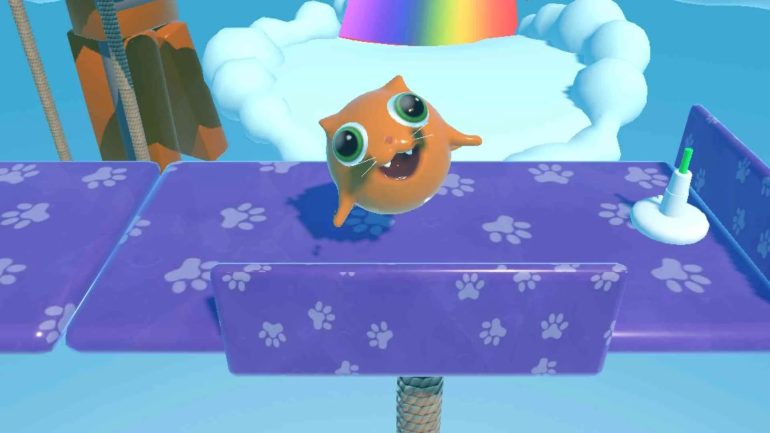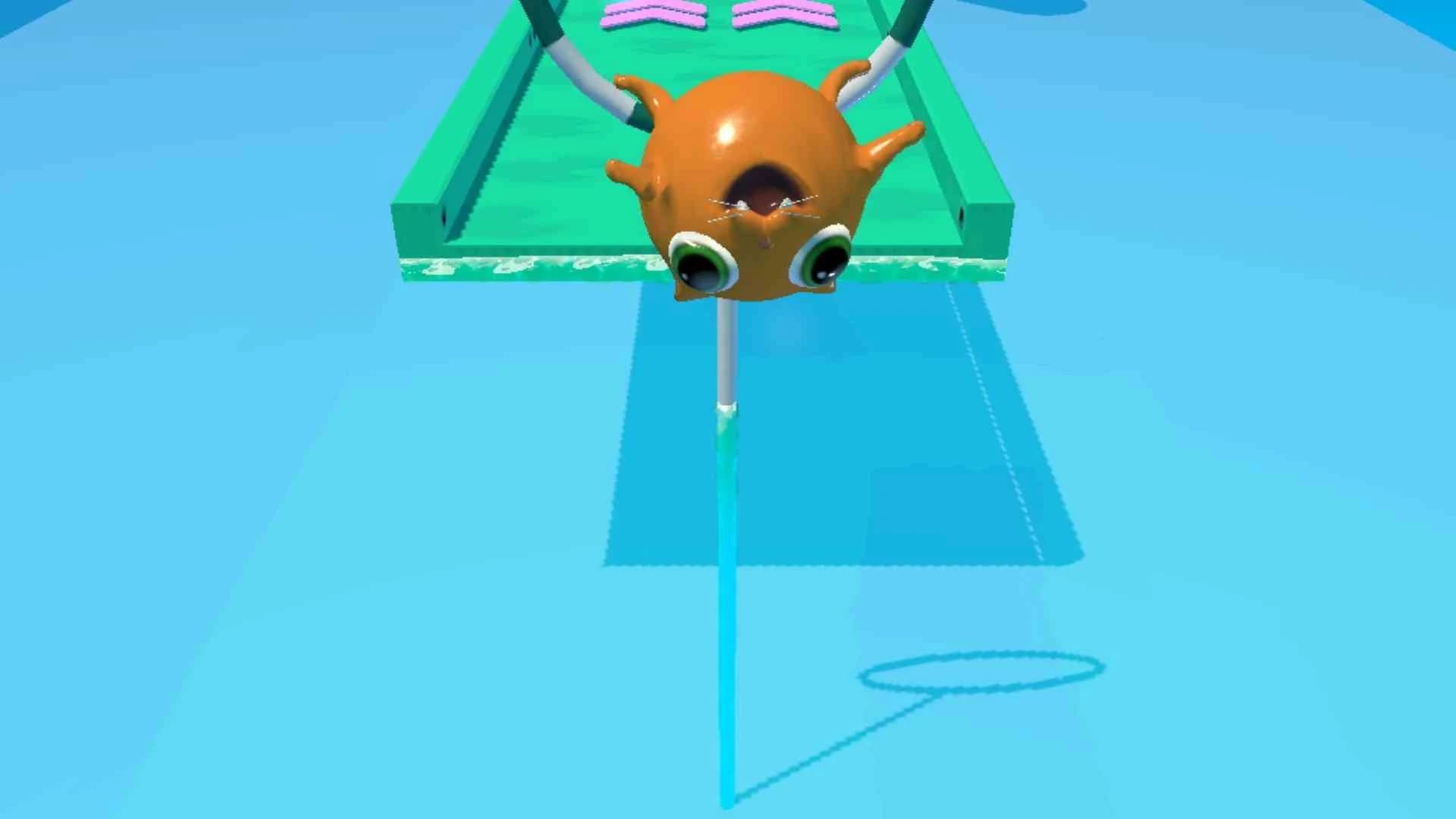Jesus Noland is a member of The Musty Creative, a group that spans multiple creative fields including video games and podcasts. Last year, the group released Fat Roll, a pretty platformer that follows a rotund cat on a grand adventure. We spoke with Jesus to learn more about Fat Roll, as well as the advice he would give to aspiring developers that don’t know where to start.
- LoopBreak: Can you talk about your original inspiration to create Fat Roll?
Noland: So, the original inspiration for creating Fat Roll was really just to make a small game, to have a full level with all the UI built-in and to create a game that people could play and enjoy all the way through. It was Christmas time in 2018, and I was hanging out with my family. My brother-in-law Wesley asked me, “What kind of games can you make?” At that time, I could make a roll-a-ball. So we worked together and he actually designed the first level. It was originally called Razor’s Edge. It was just one simple level where you’d just roll a ball and go from point A to point B, making sure you don’t fall off. And if you did fall, you’d have to restart from the very beginning.
I showed the game to my friend, Matt, who is a 3D artist, and he kind of played with the idea of making the ball a cat. So, he created this weird-looking, bloated cat which later became Hubert. We were thinking about a name for the game and finally agreed upon Fat Roll. The goal was just to get the cat closer and closer to the bowl of milk in the sky. That was essentially it. Can we help this cat get to the big bowl of milk in the sky?
- LoopBreak: Fat Roll was in development for three years. Can you talk about the biggest challenges during that period? And how you overcame them?
Noland: Fat Roll 1.0 was in development for three years and eight months, and the biggest challenge was just finding the time to work on it. All the core team members, Matthew, Olivia, Michelle, and I, work full-time jobs. This was the first mobile game that we ever made, so finding time was the biggest challenge. I’d say the next biggest challenge was organizing the project correctly. Getting the code, the story, the voice actor, music, sound effects, and putting it all together. Making sure that the player can save their progress was the second most difficult challenge.
The next biggest challenge was level design. Again, I am very inexperienced, and I learned how to design levels while developing Fat Roll. It was a struggle because we got so many notes from playtesting with people from all different gameplay experiences. Some said the game was too easy while others said the game was too hard. Also, game UI development is not easy. I overcame these challenges by persistently Googling and YouTubing for answers, and prioritizing time within my busy schedule for game development. I also got help from a professional game designer who was a previous co-worker of mine.
- LoopBreak: Can you talk about your general experience as a black indie dev? And the importance of having more game developers from black and minority backgrounds?
My mom is from Guatemala and my dad was born in the USA. My great great grandfather on my father’s side of the family was a slave, so it’s interesting coming from both of those cultures and communities. It is definitely great to see other black and brown game developers in the industry. There was a game that recently came out a couple of years ago called Kena: Bridge of Spirits and the two people presenting the game were black (I think they are brothers). I bought their game and I’ve been playing it recently. That game is amazing! They did such a great job! When I saw them on screen, talking and going through their game, I felt so encouraged and proud of them for making such high-quality games.
So, it’s very important for me to see black and brown people being a part of the space because I now see more and more that I belong here too. Also, from an entertainment standpoint, it’s just boring to have all the assets on the Unity Asset Store mainly be about high medieval European fantasy, American-looking cities, or Japanese cities. It is not a full representation of the entire world. When it comes to the art assets, there isn’t much diversity, including from an architectural standpoint. I would love to see games take on different cultures in South America, Central America, Africa, and other parts of Asia that aren’t Japan, like Singapore, Indonesia, or the Philippines. I think that would be super cool.
As far as seeing more people of color in the limelight, like on the stage at E3 or GDC, or now with all these developer previews they do on YouTube, I want to see more black and brown people. At the same time, it also depends on the industry, right? Hiring practices need to change and black and brown people need to have the space to be themselves once they’re hired onto these teams. My experience as a black indie dev has been good. I don’t have people against me that I know of, but I am struggling to find a community of support to make my games. There were some days where I felt so discouraged to keep on going that I wanted to quit. You can start to associate your game’s success with your value. And when I would get ghosted by people in the industry after asking for feedback on my game, I felt very lonely.
- LoopBreak: What advice would you give aspiring game developers who don’t know where to start?
If you’re an aspiring game developer and you don’t know where to start, I think the best place to start is to find a YouTube channel that you enjoy that features game development. Just watch it for a couple of weeks and see how it’s possible to make games from the person that’s running the channel. Get inspired by game developers and then pick up a Udemy course that is on sale. Create an account, wishlist a course you like, and wait for it to go on sale. As far as YouTube channels are concerned, I’m really in love with Code Monkey! They do an amazing job! They are very inspirational and sometimes put out free courses on the channel. Next, make a simple game to get those fundamentals down for basic C# programming. Once you do that, join a couple of game jams, but don’t rush yourself. It’s not a race, it’s a journey. So, join a couple of game jams throughout the year and publish your games on Itch.io. Get people to play your games and you’ll start to learn what people like about your gameplay. You’re going to have to learn to persevere through tough challenges because there’s going to be something you’re confused about every day. You’re going to have to learn how to Google very well and read forum posts to find solutions. Lastly, find great artists and never let them go (but also treat them with respect).
Jesus’ game, Fat Roll, is available now on Google Play! We’ve got a solid archive of interviews with game developers if you’re hungry for more content.



